theartsdesk in Denmark: SPOT Festival 2012, Aarhus | reviews, news & interviews
theartsdesk in Denmark: SPOT Festival 2012, Aarhus
theartsdesk in Denmark: SPOT Festival 2012, Aarhus
Thoughts of the past and identity are triggered by Denmark's annual musical showcase
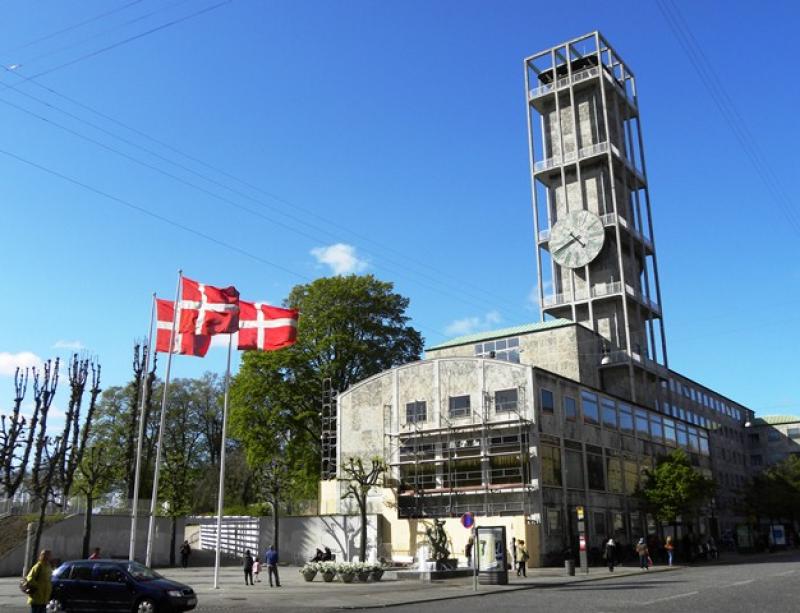
For a Brit navigating Denmark’s annual showcase of home-grown music, it’s impossible to eradicate thoughts of the Danish TV seen in the UK recently. Obviously, detecting Borgen-style intrigue while wandering around is unfeasible. But something else might be more obvious. However bright the sun, the wind is cold and warmish clothing is essential. Yet no one sports a Sarah Lund jumper. It’s a reminder that TV drama isn’t a guidebook.
The lack of Faroese knitwear was more than mitigated by some great discoveries. Denmark is as vital as the other Nordic and Scandinavian nations, even though it hasn’t carved a musical path as instantly identifiable as, say, Iceland or Sweden. The host city of Aarhus itself – Denmark’s second city – is also diverting.
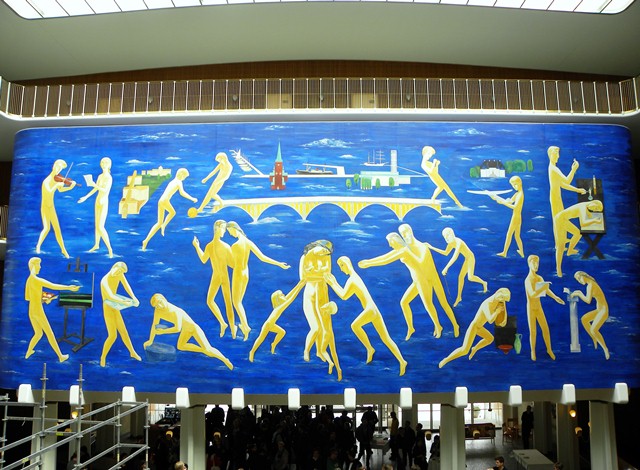 On the Friday, the festival held a lunch at the Rådhus, the city hall. This remarkable building, designed by Erik Møller and Arne Jacobsen (the designer of the always covetable Egg chair), opened in July 1941. Strikingly modernist, it must have seemed alien when it was inaugurated. But the chance for any outsiders to see it then was slim. Germany had invaded Denmark in April 1940, while construction of the Rådhus was well underway. This building’s early history makes it more than a collection of fixtures, fittings, concrete and Norwegian marble. It’s a symbol of Danish identity being preserved during the occupation.
On the Friday, the festival held a lunch at the Rådhus, the city hall. This remarkable building, designed by Erik Møller and Arne Jacobsen (the designer of the always covetable Egg chair), opened in July 1941. Strikingly modernist, it must have seemed alien when it was inaugurated. But the chance for any outsiders to see it then was slim. Germany had invaded Denmark in April 1940, while construction of the Rådhus was well underway. This building’s early history makes it more than a collection of fixtures, fittings, concrete and Norwegian marble. It’s a symbol of Danish identity being preserved during the occupation.
Thorvald Hagedorn-Olsen’s mural “Menneskesamfundet” (human society), depicting the city and its citizens at work and play, overhangs the entrance hall of the Rådhus (pictured above right). The family is at its centre. Begun in 1939, it was finished in 1947 and is all-the-more powerful considering its completion was interrupted during the occupation. Its message about character was unacceptable.
Aarhus (formerly Århus) had established its identity long before World War Two. Situated on the eastern Jutland coast, it’s a historic and strategically located place. Remains of buildings from the city’s Viking-era foundation survive in the basement of a branch of the Nordea bank a few minutes walk from the Rådhus.
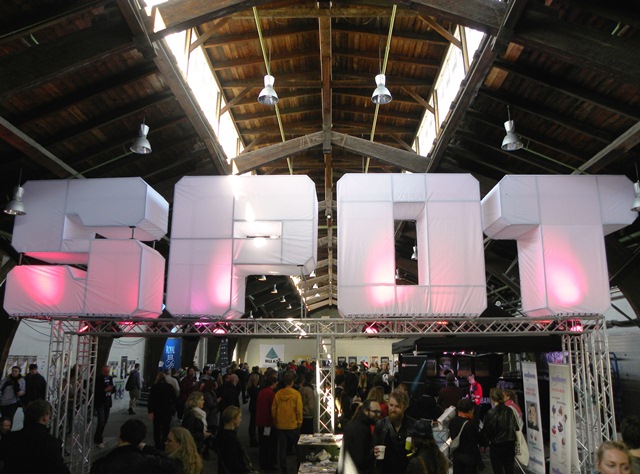 Pop was exported from Denmark a little later than the Vikings. Rock ‘n’ roll hit big and the impact of The Beatles meant there was a thriving beat scene. All that remained a local flavour until the psychedelic-era. The late Sixties saw Young Flowers and Savage Rose become the first Danish bands to play the States. The current line up of The Savage Rose were playing SPOT, emphasising the importance to the festival of lineage in Danish music.
Pop was exported from Denmark a little later than the Vikings. Rock ‘n’ roll hit big and the impact of The Beatles meant there was a thriving beat scene. All that remained a local flavour until the psychedelic-era. The late Sixties saw Young Flowers and Savage Rose become the first Danish bands to play the States. The current line up of The Savage Rose were playing SPOT, emphasising the importance to the festival of lineage in Danish music.
SPOT is sold out. Locals are supplemented by a scads of music biz types from neighbouring Germany. There are also visitors from America, Austria, Britain and France. The wider Nordic world is here too, and a few bands each from Finland, Iceland, Norway and Sweden are playing. As well as the reheated Savage Rose, Danish successes Alphabeat and The Ravonettes are playing. Alphabeat’s sunny dance-pop is what it is, but The Ravonettes are what they were. Playing their first EP with a reinstated early line up makes the statement it’s the Danish flag being waved here.
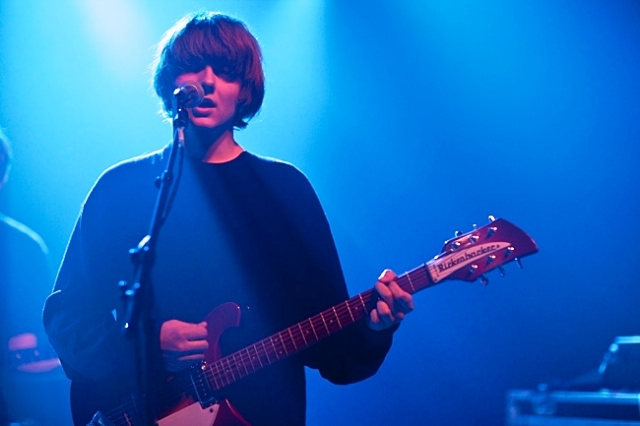 Musically, at SPOT, that flag points in an awful lot of directions. The duo Bottled in England specialise in drum and bass. Thee Attacks were mid-Sixties mod types and incredibly powerful live, but have now incorporated a Seventies/MC5 edge. The Søren Dahl Jeppesen Quartet are satin-smooth jazzers.
Musically, at SPOT, that flag points in an awful lot of directions. The duo Bottled in England specialise in drum and bass. Thee Attacks were mid-Sixties mod types and incredibly powerful live, but have now incorporated a Seventies/MC5 edge. The Søren Dahl Jeppesen Quartet are satin-smooth jazzers.
The festival was opened by what initially sounded unpromising: a collaboration between Mike Sheridan and other musicians, where his electronica palled-up with violin/cello, piano/harmonium and a range of percussion. It was hard to see how it could gel. But in the event it worked a dream, conjuring a psychedelia which flowed from peak to trough with ambient textures and gentle flourishes evoking Krautrock’s gentle side.
Waldo & Marsha (named after the protagonists in The Velvet Underground’s “The Gift”) nod to both Slowdive and Ariel Pink, with a terrifically assured frosty shoegazing (pictured above left, photo by Steffen Jörgensen). Shiny Darkly are more jagged but in the same ballpark and less confident live than on their debut EP. First album Echo & the Bunnymen is their jumping off point.
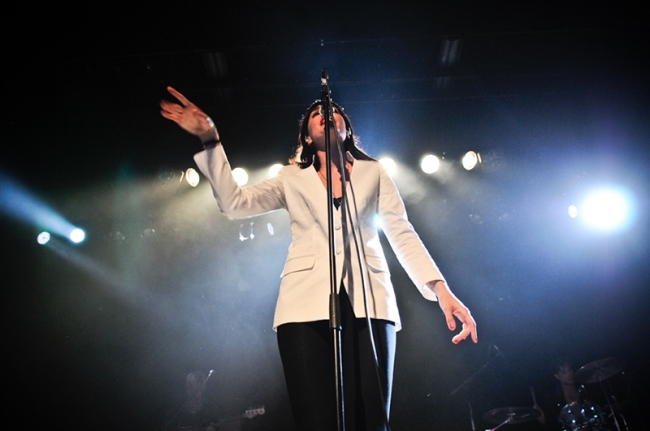 SPOT’s pop crown went to Freja Loeb (pictured above, photo by David Bust), whose debut album covers the ground between Kim Wilde, Eighties Fleetwood Mac and The Cocteau Twins. Live though, she and her four-piece male band eschewed the friendliness of the recorded version and embraced a full-on attack tooled for stadia. The band arrived on stage in their matching haircuts to instrumentally set the scene for a super-charged Loeb. Stylised and diamond-hard, there’s no reason why this cracking pop shouldn’t go across big anywhere.
SPOT’s pop crown went to Freja Loeb (pictured above, photo by David Bust), whose debut album covers the ground between Kim Wilde, Eighties Fleetwood Mac and The Cocteau Twins. Live though, she and her four-piece male band eschewed the friendliness of the recorded version and embraced a full-on attack tooled for stadia. The band arrived on stage in their matching haircuts to instrumentally set the scene for a super-charged Loeb. Stylised and diamond-hard, there’s no reason why this cracking pop shouldn’t go across big anywhere.
Immediately after that, the super Penny Police were an enormous contrast. The band and alter-ego of Marie Fjeldsted, Penny Police is altogether more intimate and reflective than Loeb. With her autoharp and jazzy touches, the Fjeldsted's folk-pop reaches out in a different way to Loeb, but is just as striking.
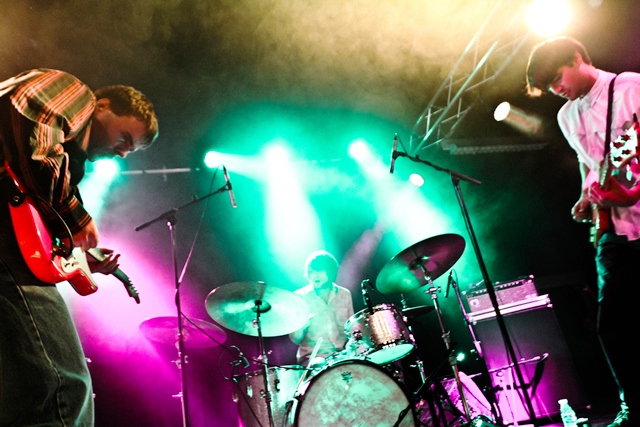 These were highlights, standout shows. But amongst the huge amount on offer, one band stood apart. Playing a room in the newly opened Godsbanen, a converted former railway station, Papir (Danish for Paper) soon divided opinions (pictured right, photo by Thorsten Iversen). They came on stage to a full venue, but after 20 minutes a third of the audience had left. Those staying were seduced. This all-instrumental Copenhagen three piece might be Tortoise-schooled post-rockers. They might also might be wah-wah pedal-obsessed Jimi Hendrix or jazz-rockers of the fusion variety. Hawkwind too. But instead, despite all these things being in there, they were more. Like Mike Sheridan, they were psychedelic, but in a kinetic rather than head-nodding way. Powerful too. Papir were deeply satisfying.
These were highlights, standout shows. But amongst the huge amount on offer, one band stood apart. Playing a room in the newly opened Godsbanen, a converted former railway station, Papir (Danish for Paper) soon divided opinions (pictured right, photo by Thorsten Iversen). They came on stage to a full venue, but after 20 minutes a third of the audience had left. Those staying were seduced. This all-instrumental Copenhagen three piece might be Tortoise-schooled post-rockers. They might also might be wah-wah pedal-obsessed Jimi Hendrix or jazz-rockers of the fusion variety. Hawkwind too. But instead, despite all these things being in there, they were more. Like Mike Sheridan, they were psychedelic, but in a kinetic rather than head-nodding way. Powerful too. Papir were deeply satisfying.
Voices this varied don’t point to Denmark’s music as a single thing. It isn’t, and couldn’t be. Sarah Lund’s jumper from The Killing has been latched onto as something emblematically Danish. It might be, but it doesn't represent all of Denmark. And none of the bands playing SPOT represent all Denmark’s music. The opening of the Rådhus during the German occupation asserted Denmark’s identity during a period when that was threatened, and a music festival will never have a similar charge. But by providing a platform to all this music, of whatever style, SPOT loudly shouts the message that Denmark wants to, has to, be heard.
Watch Papir perform at Copenhagen's Lars Olsen Gallery
Explore topics
Share this article
The future of Arts Journalism
You can stop theartsdesk.com closing!
We urgently need financing to survive. Our fundraising drive has thus far raised £49,000 but we need to reach £100,000 or we will be forced to close. Please contribute here: https://gofund.me/c3f6033d
And if you can forward this information to anyone who might assist, we’d be grateful.

Subscribe to theartsdesk.com
Thank you for continuing to read our work on theartsdesk.com. For unlimited access to every article in its entirety, including our archive of more than 15,000 pieces, we're asking for £5 per month or £40 per year. We feel it's a very good deal, and hope you do too.
To take a subscription now simply click here.
And if you're looking for that extra gift for a friend or family member, why not treat them to a theartsdesk.com gift subscription?
more New music
 Moroccan Gnawa comes to Manhattan with 'Saha Gnawa'
Trance and tradition meet Afrofuturism in Manhattan
Moroccan Gnawa comes to Manhattan with 'Saha Gnawa'
Trance and tradition meet Afrofuturism in Manhattan
 Soulwax’s 'All Systems Are Lying' lays down some tasty yet gritty electro-pop
Belgian dancefloor veterans return to the fray with a dark, pop-orientated sound
Soulwax’s 'All Systems Are Lying' lays down some tasty yet gritty electro-pop
Belgian dancefloor veterans return to the fray with a dark, pop-orientated sound
 Music Reissues Weekly: Marc and the Mambas - Three Black Nights Of Little Black Bites
When Marc Almond took time out from Soft Cell
Music Reissues Weekly: Marc and the Mambas - Three Black Nights Of Little Black Bites
When Marc Almond took time out from Soft Cell
 Album: Mobb Deep - Infinite
A solid tribute to a legendary history
Album: Mobb Deep - Infinite
A solid tribute to a legendary history
 Album: Boz Scaggs - Detour
Smooth and soulful standards from an old pro
Album: Boz Scaggs - Detour
Smooth and soulful standards from an old pro
 Emily A. Sprague realises a Japanese dream on 'Cloud Time'
A set of live improvisations that drift in and out of real beauty
Emily A. Sprague realises a Japanese dream on 'Cloud Time'
A set of live improvisations that drift in and out of real beauty
 Trio Da Kali, Milton Court review - Mali masters make the ancient new
Three supreme musicians from Bamako in transcendent mood
Trio Da Kali, Milton Court review - Mali masters make the ancient new
Three supreme musicians from Bamako in transcendent mood
 Hollie Cook's 'Shy Girl' isn't heavyweight but has a summery reggae lilt
Tropical-tinted downtempo pop that's likeable if uneventful
Hollie Cook's 'Shy Girl' isn't heavyweight but has a summery reggae lilt
Tropical-tinted downtempo pop that's likeable if uneventful
 Pop Will Eat Itself's 'Delete Everything' is noisy but patchy
Despite unlovely production, the Eighties/Nineties unit retain rowdy ebullience
Pop Will Eat Itself's 'Delete Everything' is noisy but patchy
Despite unlovely production, the Eighties/Nineties unit retain rowdy ebullience
 Music Reissues Weekly: The Earlies - These Were The Earlies
Lancashire and Texas unite to fashion a 2004 landmark of modern psychedelia
Music Reissues Weekly: The Earlies - These Were The Earlies
Lancashire and Texas unite to fashion a 2004 landmark of modern psychedelia
 Odd times and clunking lines in 'The Life of a Showgirl' for Taylor Swift
A record this weird should be more interesting, surely
Odd times and clunking lines in 'The Life of a Showgirl' for Taylor Swift
A record this weird should be more interesting, surely

Add comment